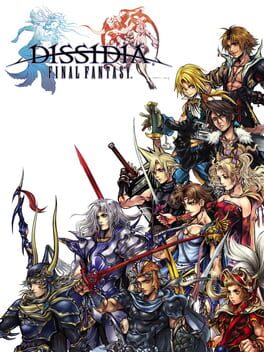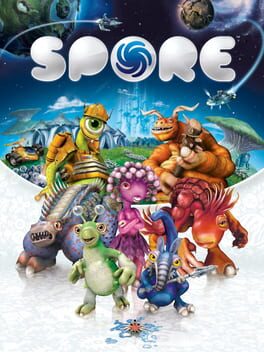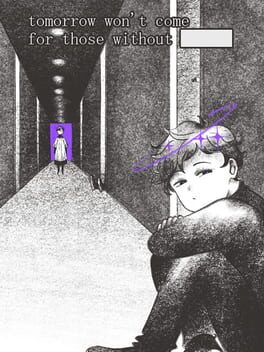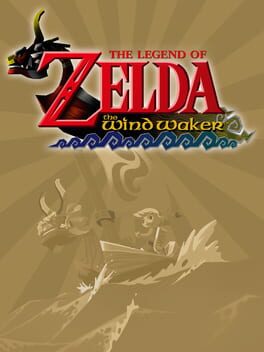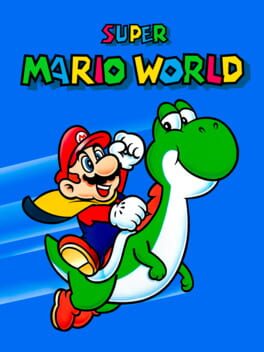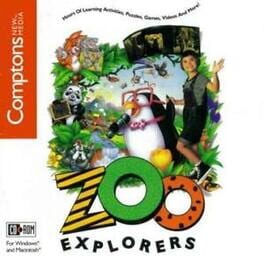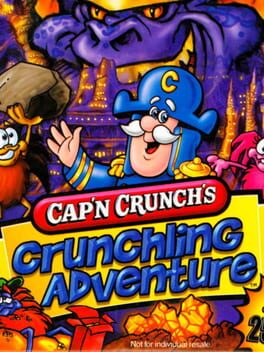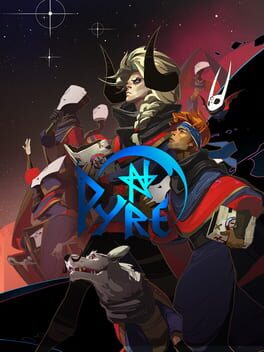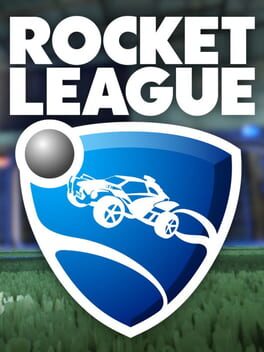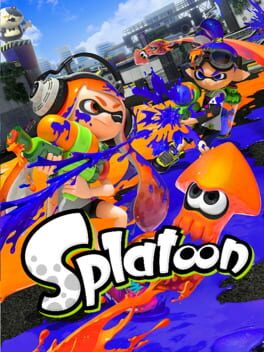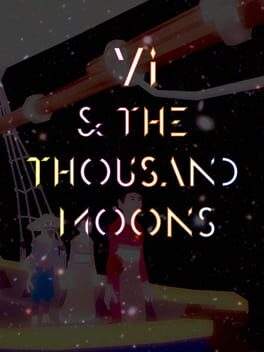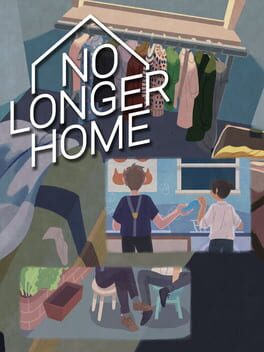Hot_Anarcocoa
BACKER
As someone who has played every main series Final Fantasy game minus the MMOs, I was really looking forward to a big crossover FF fighter. Unfortunately the mechanics here are just dull. It's been a while since I've played this but iirc you only get like 6 moves divided into 3 for when you're on the ground and 3 for when you're in the air. There's not a whole lot to the movement either, you're mainly just locking onto something and dashing towards it in a straight line. The story is also not much to think of, basically being a big good vs evil fight. While the novelty of all my favorite Final Fantasy characters interacting was enough for me as a teen, I fear many of these interactions boil down to "What is the biggest most stereotypical trait of this character, let's have them do that." If you're really craving a better Final Fantasy crossover game, and you aren't totally averse to chibi anime style humor, I'd say skip this series and go on over to World of Final Fantasy, which I enjoyed much more.
2008
This game gets too much hate, the creature creator alone gave me hours upon hours of fun. You could just go into that thing with no idea what you wanted to make and fiddle around with shapes, and eventually you'd have a totally unique creature that you could play around with and share and it would pop up in other people's games, it was rad! I also think the game works well as an introduction to learning about evolution for kids, which I like! More edutainment games that function primarily as games rather than dull lessons are good! As far as the gameplay of the different phases, they play like more simplified versions of other games, but I still had a lot of fun especially with the creature and tribal phases because I always wanted to see how all the creatures I created would do stuff! Only abandoned because the space stage takes way too long and bored me, but I did look up the ending cutscene and thought it was funny.
2001
2019
This review contains spoilers
It's really easy to make fun of Kojima labeling this game as a new genre, a "strand-type game", but in a way I see what he's trying to get at. It's weird to me that around the time of this game's release so much of the talk around it was "What is this about!?" and the plethora of explainers and overly long videos online. This game hammers you on the head over and over with what it's about: connection. This, I believe, is the core of what makes something a "strand-type game." It's not the long cinematic cutscenes, it's not the even longer stretches of traversing the world, it's connection.
While many of the complaints around this game center around how its gameplay consists primarily of traversing a largely empty landscape, it is this design choice which I think binds the game together with its narrative themes so well. The inhabitants of this world have chosen to isolate themselves from society. Your protagonist, a delivery contractor named Sam Porter-Bridges, likewise lives his life mostly in solitude. It's not an easy life for him, but it's one he's become comfortable in. As much as people say that this game's world is barren, it is not void of obstacles. This is a "walking sim" in a truer sense than most, as the challenge of the game is figuring out how to get from place to place while trying to have the least amount of environmental hinderances in your path. Choosing what gear to bring along with you, and how heavy a load to carry, using what knowledge you have about the path to your destination to inform your decisions.
It is not long into the game however, that the narrative forces Sam to begrudgingly enter into a contract to try to reconnect America. You do so by delivering packages to various locations, some larger key delivery points, but also smaller, single occupancy residential units. By delivering repeatedly to these places, you build interpersonal connections with their residents, as well as convincing them to join the chiral network. Joining the chiral network is a larger form of connection, essentially an internet which allows communication across long distances, but it is also how the game allows you to build structures in those areas, most importantly bridges and highways.
It is not only through these narrative beats however, that the gameplay options open up and reinforce these themes of connection. It is also in the way the game uses its online functionality, to connect you with real world players. Building a highway across America is understandably both the most useful and the most difficult thing in the game, as it's a task which requires vast amounts of resources to achieve. At one point in the game I hadn't realized that it was only in the areas connected to the chiral network which other players could contribute to my structures. This made a couple segments of road incredibly arduous to build, requiring me to make a much larger amount of deliveries and searching harder for the specific resources I needed to build that road. Once I realized my mistake, it obviously became priority to establish connections across the various areas, so that I could receive help from the other players, and we could all contribute our various parts to create a much larger whole, and make this environment which was once harsh to traverse, into a vast connection of structures and characters. One of the most interesting elements of this game's online functionality, and one which I believe is core to the "strand-type game" is the fact that you never actually see any of these players who help you and likewise, they never see you. You can see the name of a person who built a structure, and you can go into the menu and see their profile, and establish connections with specific players if you've noticed them being particularly helpful; but you never see them running around in the world itself, you see merely what they've left behind. It's a design choice that at once prevents the typical hazards of introducing online play into a game: the other players cannot grief you or try to ruin your immersion. But it also instills a sense that none of this mutual aid is being done purely for selfish gain. When you leave a rope behind that you may never use again, you do so with the belief but not necessarily the knowledge that maybe at some time, it may help another player along the same path. When you establish the chiral connection you do so in the knowledge that you'll receive a benefit from it, but also that you will be benefitting others along their way. The connections we build form a vast web that branches out into many directions and go further than we'll ever be able to see, but we know they have an effect nevertheless.
The game does stumble in places though. My biggest critique would be that, either due to lack of imagination, or wide appeal as a AAA game, the game can't have any biting commentary on what connections would be helpful. It's all this vague idea that "uniting America" and "bringing people together again" is the most important thing. But that could be interpreted as some really milquetoast liberal rhetorical speech like Die Hardman gives, or it could be interpreted as restructuring society, but I think you have to bring your own beliefs to the latter, the game won't put them there. In its apprehension to make a more radical statement, it loses a potentially stronger message. Also, Kojima's obsessions with brands and celebrity are very present in this game which, coupled with the the fetishistic way this game talks about America, cast doubt on a more potentially radical message that this game could have.
There are people in bunkers in the game who actually give critiques of past-America but then they join the UCA because "maybe this time we'll be more connected and better off." But it's never stated how exactly things will fundamentally change. It strikes me in the same way as when liberals talk about how "Trump has divided us." But like, no dude, there were many systems in place already dividing us, and I'm not sure this game knows that. It just gestures at a vague "help each other" which every player can neatly fit into their own worldview.
Overall I liked the game, but I'd like to see the same ideas tackled by someone willing to be more radical with it. As pretentious as labeling your own game as a new genre that is named after said game is, I'd like to see more games that use this core idea of exploring connection through mechanics come about. In a medium filled with ample depictions of competition and struggle, this game's clever design choices bring refreshing new options to the medium.
Side note: I think Kojima might hate women a little bit. And wtf was that part where you rescue Amelie and Fragile is like "Oh I see u don't need me anymore!" Like was there supposed to be an implied romance all of a sudden!?
While many of the complaints around this game center around how its gameplay consists primarily of traversing a largely empty landscape, it is this design choice which I think binds the game together with its narrative themes so well. The inhabitants of this world have chosen to isolate themselves from society. Your protagonist, a delivery contractor named Sam Porter-Bridges, likewise lives his life mostly in solitude. It's not an easy life for him, but it's one he's become comfortable in. As much as people say that this game's world is barren, it is not void of obstacles. This is a "walking sim" in a truer sense than most, as the challenge of the game is figuring out how to get from place to place while trying to have the least amount of environmental hinderances in your path. Choosing what gear to bring along with you, and how heavy a load to carry, using what knowledge you have about the path to your destination to inform your decisions.
It is not long into the game however, that the narrative forces Sam to begrudgingly enter into a contract to try to reconnect America. You do so by delivering packages to various locations, some larger key delivery points, but also smaller, single occupancy residential units. By delivering repeatedly to these places, you build interpersonal connections with their residents, as well as convincing them to join the chiral network. Joining the chiral network is a larger form of connection, essentially an internet which allows communication across long distances, but it is also how the game allows you to build structures in those areas, most importantly bridges and highways.
It is not only through these narrative beats however, that the gameplay options open up and reinforce these themes of connection. It is also in the way the game uses its online functionality, to connect you with real world players. Building a highway across America is understandably both the most useful and the most difficult thing in the game, as it's a task which requires vast amounts of resources to achieve. At one point in the game I hadn't realized that it was only in the areas connected to the chiral network which other players could contribute to my structures. This made a couple segments of road incredibly arduous to build, requiring me to make a much larger amount of deliveries and searching harder for the specific resources I needed to build that road. Once I realized my mistake, it obviously became priority to establish connections across the various areas, so that I could receive help from the other players, and we could all contribute our various parts to create a much larger whole, and make this environment which was once harsh to traverse, into a vast connection of structures and characters. One of the most interesting elements of this game's online functionality, and one which I believe is core to the "strand-type game" is the fact that you never actually see any of these players who help you and likewise, they never see you. You can see the name of a person who built a structure, and you can go into the menu and see their profile, and establish connections with specific players if you've noticed them being particularly helpful; but you never see them running around in the world itself, you see merely what they've left behind. It's a design choice that at once prevents the typical hazards of introducing online play into a game: the other players cannot grief you or try to ruin your immersion. But it also instills a sense that none of this mutual aid is being done purely for selfish gain. When you leave a rope behind that you may never use again, you do so with the belief but not necessarily the knowledge that maybe at some time, it may help another player along the same path. When you establish the chiral connection you do so in the knowledge that you'll receive a benefit from it, but also that you will be benefitting others along their way. The connections we build form a vast web that branches out into many directions and go further than we'll ever be able to see, but we know they have an effect nevertheless.
The game does stumble in places though. My biggest critique would be that, either due to lack of imagination, or wide appeal as a AAA game, the game can't have any biting commentary on what connections would be helpful. It's all this vague idea that "uniting America" and "bringing people together again" is the most important thing. But that could be interpreted as some really milquetoast liberal rhetorical speech like Die Hardman gives, or it could be interpreted as restructuring society, but I think you have to bring your own beliefs to the latter, the game won't put them there. In its apprehension to make a more radical statement, it loses a potentially stronger message. Also, Kojima's obsessions with brands and celebrity are very present in this game which, coupled with the the fetishistic way this game talks about America, cast doubt on a more potentially radical message that this game could have.
There are people in bunkers in the game who actually give critiques of past-America but then they join the UCA because "maybe this time we'll be more connected and better off." But it's never stated how exactly things will fundamentally change. It strikes me in the same way as when liberals talk about how "Trump has divided us." But like, no dude, there were many systems in place already dividing us, and I'm not sure this game knows that. It just gestures at a vague "help each other" which every player can neatly fit into their own worldview.
Overall I liked the game, but I'd like to see the same ideas tackled by someone willing to be more radical with it. As pretentious as labeling your own game as a new genre that is named after said game is, I'd like to see more games that use this core idea of exploring connection through mechanics come about. In a medium filled with ample depictions of competition and struggle, this game's clever design choices bring refreshing new options to the medium.
Side note: I think Kojima might hate women a little bit. And wtf was that part where you rescue Amelie and Fragile is like "Oh I see u don't need me anymore!" Like was there supposed to be an implied romance all of a sudden!?
Played through this again to see if I could pick up on more in the story because I was worried that maybe I didn't give it a fair shot my first go 'round. I definitely did pick up on more the second go 'round, mostly because I was actively looking out for specific things this time. I think a big issue I have with this game is that it's written/structured in such a way that I spent more time trying to decode what the themes it was trying to get at were, than I spent actually engaging with those themes on any deeper level. And like, even after a second playthrough, there are still bits that are confusing to me, and there are bits that strike me as problematic but I'm cautious of critiquing them too hard because I don't know if I even have an accurate interpretation of what this game's message is. I guess my final thought at the end of this second playthrough is that I just wish there was more clarity.
I wish I got as into the story on this one as much as some other reviewers here because I have to say, I enjoyed some of y'alls reviews more than the actual game here. What I will say is that I'm baffled by the choice of including puzzles in this game. The game is relatively short, taking around 2 hrs to finish, and the only thing hindering progress are a handful of puzzles which as far as I can tell don't really add to the story. I had to look up the solutions for two of the puzzles, and I'm also not a huge fan of games that hide their "better" ending behind some obscure knowledge that most will use a guide to find. I think I would have enjoyed this a lot more as a short story because it doesn't really use the medium to its advantage here. In fact, its insistence on implementing commonly used elements of the medium actively hurt it.
1990
1995
2017
Gameplay that is as creative as it is fun, there's no other game like this out there. The way they manage to tie the gameplay into the story here is also great, as you'll be thinking about your wins and losses in order to level the character who you want to free, which then removes them from your roster, as well as thinking about which opposing team you want to elevate for the final showdown. Supergiant really managed to master the art of letting failure become not a hinderance, but an asset to their story with this game. Every character has something to love about them here and it really makes you invested in thinking about who to free, or who would even want to return if given the chance. Darren Korb of course knocks it out of the park with a banger soundtrack once again, with a nice creative treat waiting for you with one of the songs, if you've played you know which one. I only subtract half a star because well...this game is about overthrowing a tyrannical monarch but...well it's a bourgeois revolution. You're essentially doing the fantasy equivalent of the American revolution here. You overthrow the monarch only to establish a Liberal republic in which the merchant class still gets to amass vast riches. It's a near perfect game I just wish the politics were better.
2015
I'm not even sure what to say about this one other than it is the single greatest sports game ever made. Very simple mechanics, but a high skill ceiling makes it so there is always room to grow and improve your own skills with these mechanics. Even the extra modes in this feel like they could be full fledged games in their own right.
2015
Love love love this game! Single player is a bit boring except for the awesome final boss fight, but the multiplayer is incredible and probably the only thing I will ever get an S rank in online. I love how this game simultaneously proves that you can make a shooter that isn't steeped in violence, while also showing how to innovate on traditional shooter mechanics with creative movement mechanics and objectives. I also love how fast paced the matches are, with ranked battles having a timer of 5 minutes but easily being able to be finished within a couple minutes, or even 20 seconds if you manage a successful B-line with the objective. I love how during those matches, you're always able to make a comeback, as the aforementioned 20 second victory could potentially come at any point in the match even if your team has been struggling for a while. And while I also love Splatoon 2, I think the Wii U gamepad really contributes to this game. Being able to set beacons to detect enemies, and quickly glace down at your gamepad to see enemy and ally positioning, and tap on an ally to super jump to them, and then turn your eyes back towards your tv to execute your attack feels fantastic, and I much prefer it to holding down a button to bring a map overlay over the screen. Also, the ink roller is one of if not the most satisfying weapons I've ever used in a video game. Going into squid form to zip, dip, dodge, and dive around opponents and then quickly jumping out to deliver swift splats like a ninja just feels amazing. Last thing to gush over is just how aesthetically amazing this whole game is. From the very 90's bright colors and attitudes of the characters, to the whole squid soundtrack, it's just a joy throughout. Definitely my favorite multiplayer shooter franchise.
What a cool experimental game! Takes the mechanics of a walking sim and makes it a musical, with some great visuals to go along with it. The singers are also great which really helps. Apparently the devs have a lot of other games like this on their itch page, so I look forward to going through them all!
2021
No Longer Home wears its inspiration on its sleeve, having a scene from the opening of Kentucky Route Zero on its protagonist's computer screen at one point. It bears some resemblance to KRZ in its dialogue system and set design, but taking place over a much shorter time-span and much smaller space. This is a nice little slice of life game about a couple of recent college grads about to move onto the next stage of their lives. Taking place the day before the big move, it deals with a lot of the stresses and anxieties that come with not knowing what comes next in life, how your relationships might change, what personal and societal expectations there are for your future, and how the market forces of capitalism muddy the waters even further. While the visual elements are steeped in magical realism, the semi-auto-biographical nature of its writing gives the story a very personal feeling that lets you really linger in this moment of the characters lives. This could have earned an extra star if it had the time to really delve deeper into some of the topics it brings up, but for an exploration of a small moment in life, I enjoyed the brief time I spent here.
